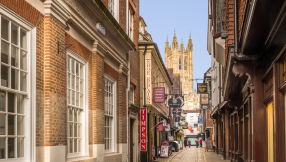
Churches in this country would be more successful if they followed the example of cathedrals and did not 'bang on' about God, the writer Sir Simon Jenkins has claimed.
Discussing his new book on England's churches at the Hay literary festival, Sir Simon said that cathedrals were successfully responding to the public's desire for a more spiritual and less religious experience.
'[There is] something about cathedrals that draws you in which is not being drawn into parish churches,' The Telegraph reported Jenkins as saying. 'One or two sociologists have explained it, one said if you go to a cathedral now it's anonymous...No one shakes you by the hand, no one says peace be upon you. I asked a canon once why cathedrals are doing so well, he said "unlike churches we don't bang on about God". Which is very odd but also I sense rather true'.
Jenkins emphasised the appeal of music and 'the spirit' in cathedrals. He said: 'Music is very important, evensong is the most popular service, people go for the music. They (cathedrals) don't feel obliged to be religious. I think the churches, particularly cathedrals, are responding to people's desire for something that they might call spiritual. They are meditative, they are buildings where people find peace. They find peace in the music and the spirit.'
Jenkins added: 'Cathedrals don't bang on about God in cathedrals but they bang on about beauty and that's why I love them.'
The author also suggested that churches should be restored to their original glory, especially those which have statues damaged or destroyed during the Reformation period.
Jenkins praised the Victorians for their attitude towards restoring such buildings. He said, 'why on earth are we leaving them in this awful state? Shouldn't we be replacing those statues? What's the point of a smashed statue? If someone gouged a picture in a gallery the restorers would get to work putting it back to how it was before. We haven't got an agreement on what to do with these magnificent buildings, we once did.'
He added: 'I find something very sad about our inability to restore them.'
Jenkins recommended visiting Dover Castle, which has been restored, saying 'it looks like an IKEA showroom... it looks awful and yet that's what it was. At the moment we see it as the Normans saw it. That's what we've got to get used to.
'We're so used to old things looking ruined, cold and white. The eye cannot adjust to the idea of antiquity being coloured'.
Jenkins was promoting a new edition of his book, England's Best Churches. He has also written a book on England's cathedrals.













